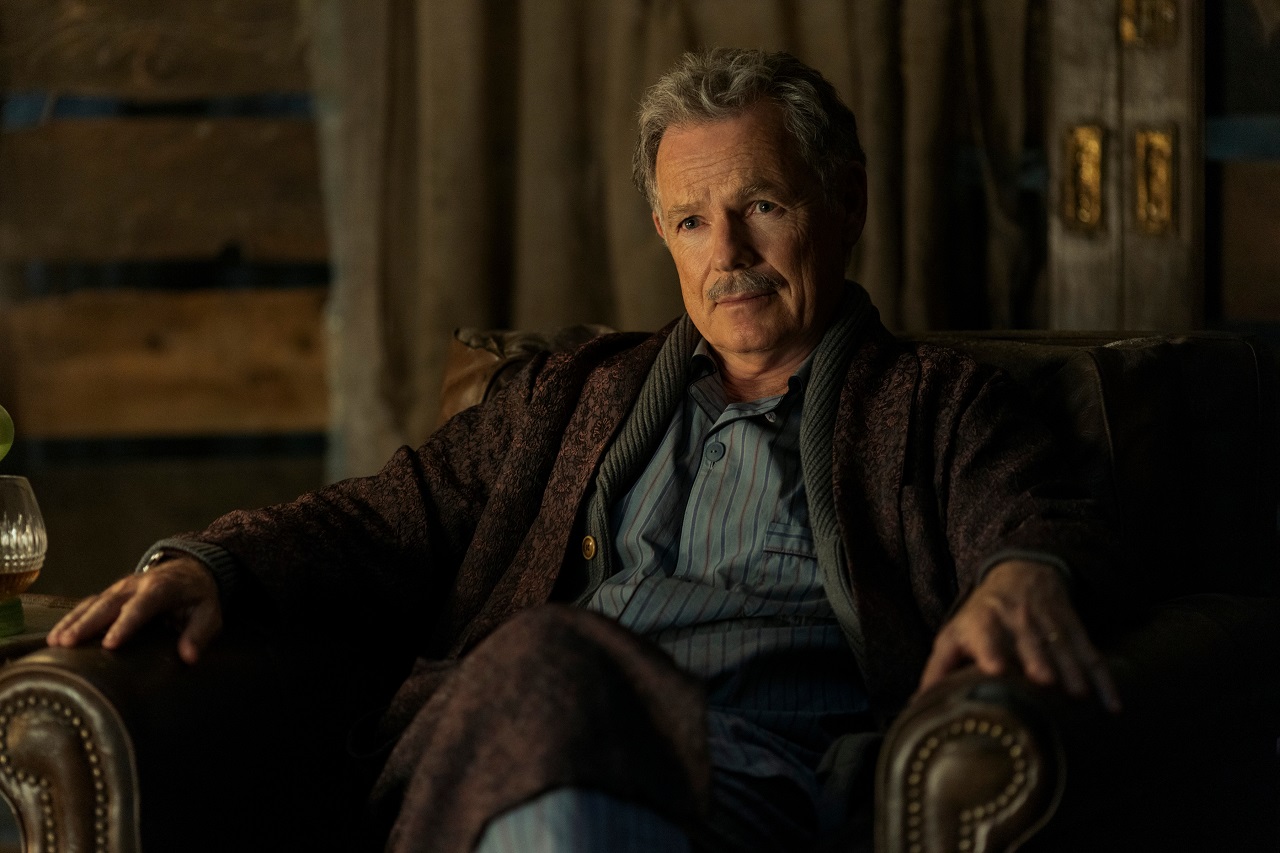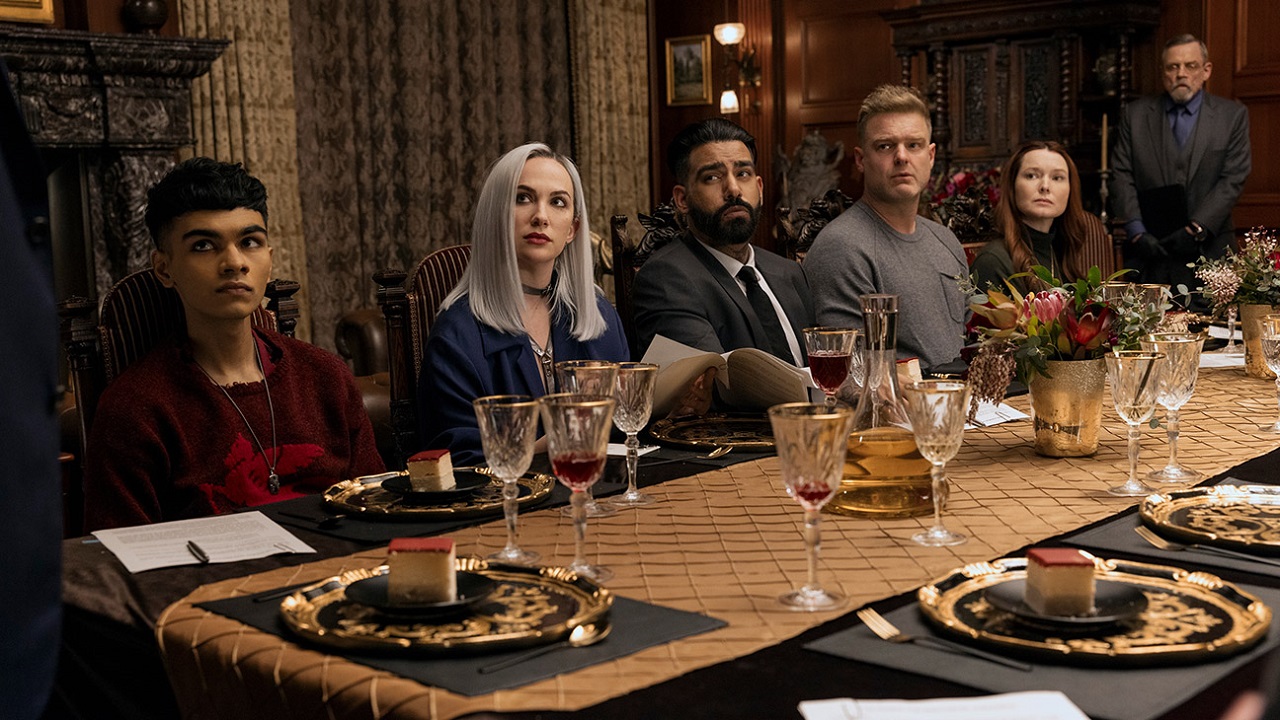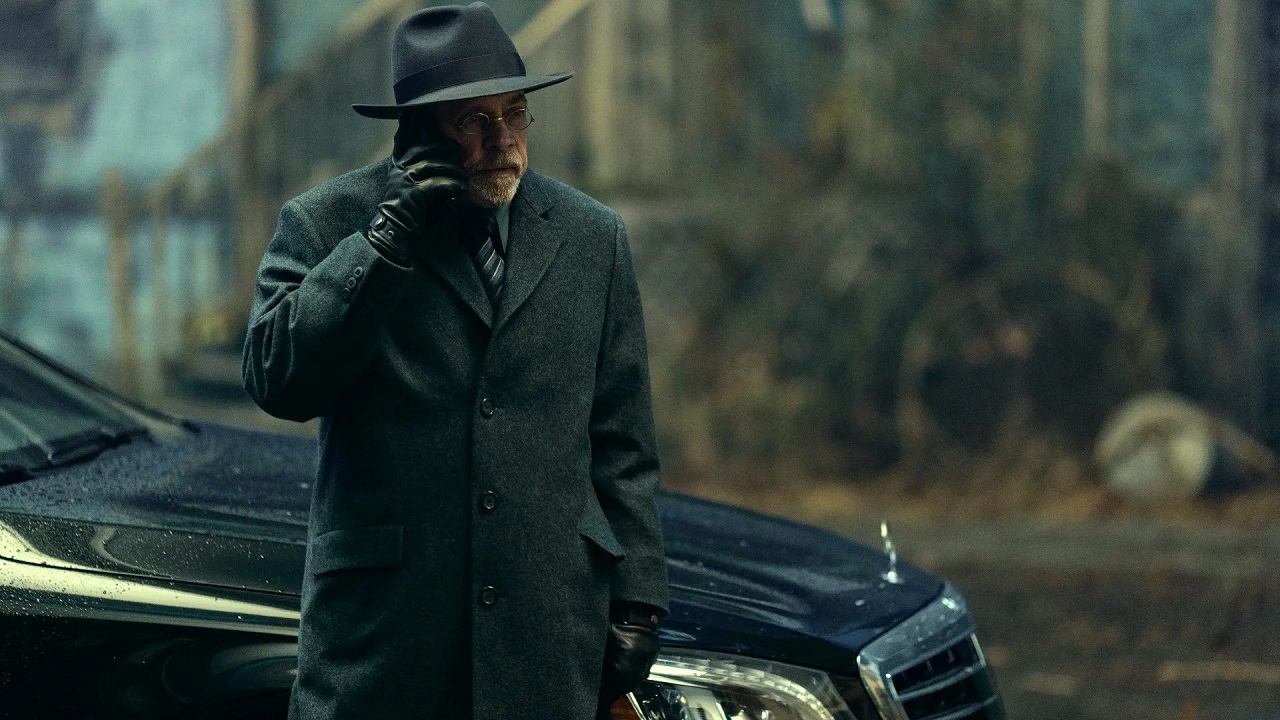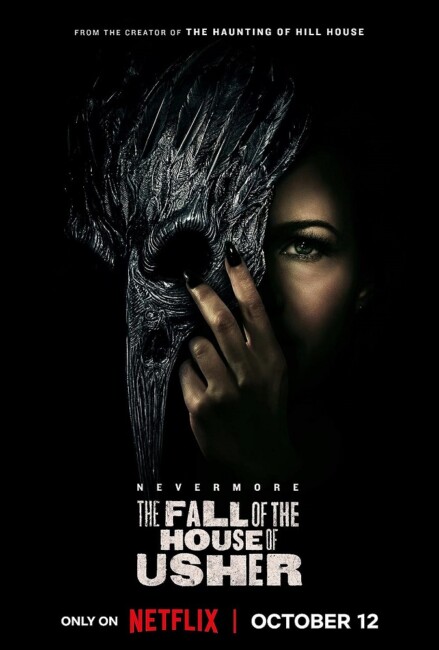USA. 2023.
Crew
Directors – (Episodes 1-2, 5-6) Mike Flanagan & (Episodes 3-4, 7-8) Michael Fimognari, Teleplay – (Episodes 1&6) Mike Flanagan, (Episode 2) Mike Flanagan & Emmy Grinwis, (Episode 3) Mike Flanagan & Justina Ireland, (Episode 4) Mike Flanagan & Mike Johnson, (Episode 5) Dani Parker, (Episode 7) Jamie Flanagan & Mike Flanagan & (Episode 8) Mike Flanagan & Kiele Sanchez, Created by Mike Flanagan, Based on The Fall of the House of Usher and other works by Edgar Allan Poe, Producers – Jamie Flanagan & Kathy Gilroy, Photography – Michael Fimognari, Music – The Newton Brothers, Visual Effects Supervisor – Bret Culp, Visual Effects – FuseFX (Supervisor – Marshall Krasser), NetFX, Rocket Science (Supervisors – John Coldrick & Tom Plaskett), WeFX Inc. (Supervisor – Sam Javanrouh) & Zoic VFX (Supervisor – Kevin Hahn), Special Effects Supervisor – Quinn Rockhill, Makeup Effects – Fractured FX, Inc., Production Design – Laurin Kelsey. Production Company – Intrepid Pictures.
Cast
Bruce Greenwood (Roderick Usher), Carla Gugino (Verna), Mary McDonnell (Madeline Usher), Carl Lumbly (Auguste Dupin), Mark Hamill (Arthur Gordon Pym), Henry Thomas (Frederick Usher), Samantha Sloyan (Tamerlane Usher), T’Nia Miller (Victorine LaFoucarde), Kate Siegel (Camille L’Espanye), Rahul Kohli (Leo Usher), Zach Gilford (Young Roderick), Willa Fitzgerald (Young Madeline), Michael Trucco (Rufus Griswold), Kyliegh Curran (Lenore Usher), Katie Parker (Annabel Lee), Ruth Codd (Juno Usher), Sauriyan Sapkota (Prospero ‘Perry’ Usher), Malcolm Goodwin (Young Dupin), Matt Biedel (William ‘Bill-T’ Wilson), Crystal Balint (Morella Usher), Paola Nuñez (Dr Alessandra Ruiz), Igby Rigney (Toby), Aya Furukawa (Tina), Annabeth Gish (Eliza), Robert Longstreet (William Longfellow), Daniel Jun (Julius), Nicholas Lea (Judge John Leal)
Plot
Roderick Usher, the aging head of Fortunato Pharmaceuticals, calls his old friend/nemesis federal prosecutor Auguste Dupin to his old family home. Fortunato is currently embroiled in a federal case brought by Dupin. At the same time, five of Roderick’s children have just died within a matter of days. Roderick promises to make a full confession to Dupin and explain that all of the deaths, even though apparently unconnected, were his fault. Roderick proceeds to tell a story of how each of his children, who sought to become entrepreneurs and innovators in the fields of health, entertainment and information technologies, befell a string of bizarre deaths. As the story unfolds, Dupin learns how this ties back to Roderick and his sister Madeline’s history as employees at Fortunato under Rufus Griswold and their rise to take over the company from under him.
Mike Flanagan has emerged as a genre director to be reckoned with in the last few years. Flanagan caught genre attention with his fourth film, the extraordinary Absentia (2011), a film that caught me completely by surprise when I went into it blind. Flanagan then went on to string of Blumhouse collaborations, Oculus (2013), Hush (2016) and Ouija: Origin of Evil (2016), and elsewhere Before I Wake (2016) and a duo of Stephen King adaptations Gerald’s Game (2017) and Doctor Sleep (2019).
Flanagan hit his peak with the mini-series The Haunting of Hill House (2018) to considerable acclaim. Since then, Flanagan has found a welcome home on Netflix, creating various horror TV Mini-Series. He created, oversaw and directed one episode of the Hill House follow-up The Haunting of Bly Manor (2020) and went on to make the original Midnight Mass (2021), while producing, directing two episodes and co-writing all of the episodes of The Midnight Club (2022). The first two of these adapt classic ghost stories – Shirley Jackson’s The Haunting of Hill House (1959) and Henry James’ The Turn of the Screw (1898). The Fall of the House of Usher seems intended to round out a third entry in a trilogy of adaptations of classic haunted house stories where Flanagan and associates take on adapting Edgar Allan Poe’s The Fall of the House of Usher (1839). (Technically The Fall of the House of Usher isn’t a haunted house story in the Poe original but does become such in the mini-series).
Now I had some problems with the idea of The Fall of the House of Usher adapted into another of Flanagan’s tv mini-series of eight episodes of around one hour in length given that the original Poe story only runs to 6500 words. The original is a well worthwhile read – probably Poe’s best story and one of his longer – but slender. Take away all the magnificent descriptions of decay and you are left with very little – the basic problem that almost any film adaptor has with Poe in that most of his stories are only around ten page reads or less and need considerable padding to work as films.
Flanagan and co work around this by making the mini-series into a medley of elements taken from various Poe stories. This works awkwardly, which I will get to in a minute. Poe’s original The Fall of the House of Usher story is a fairly simple in narrative terms – an unnamed narrator goes to visit his old friend Roderick Usher in his big decaying mansion and finds that Roderick suffers from an over-heightening of senses that has left him maddened. Meanwhile, we discover that Roderick’s sister Madeline has been buried alive and returns, bringing the house crumbling down into the tarn.

There are some semblances of the story in the mini-series. There is a Roderick Usher, although his maddening over-heightening of senses (a facet of the character in every other film adaptation) has been dropped. Carl Lumbly’s Dupin makes a stand-in for the narrator and goes to visit Roderick in his standard-sized but decaying two-storey family home (one of the big let-downs of the mini-series considering how formidable the house of Usher is in Poe’s description and various film adaptations). Roderick is now the head of a Big Pharma corporation and a peddler of opioids where the ‘house of Usher’ comes to have two meanings, firstly in terms of the physical house and more importantly in referring to the Usher dynasty, whose fall (or perhaps more accurately elimination) occurs throughout. Roderick does get a sister Madeline who he does duly bury alive from which she does get to return from the dead and bring the house down (in flames) in the final episode.
To pad the running time out, Flanagan and co have I can’t really adapted so much as have to say borrowed elements and character names from other Poe stories and updated them to a modern context. Each of the episodes is named after a Poe story – with the exception of the opening episode A Midnight Dreary, which comes from a line in Poe’s poem The Raven (1845) – and usually winds in the bizarre death that appears in said story.
Thus:-
– The Masque of Red Death (1842) is a story about a mediaeval party held by the Prince Prospero where the Red Death moves through infecting the attendees with the plague. In the episode, the youngest Usher son Prospero, nicknamed Perry, holds an exclusive party at a warehouse where he and the attendees are burned alive by toxic waste in the building’s sprinkler system.
– The Murders in the Rue Morgue (1841) is a detective story (the very first in fact) about the investigation of two dead bodies found shoved up a chimney where the murderer is discovered to be an escaped orangutan. In the episode, Kate Siegel breaks in to the animal testing facility that has been named Rue Morgue where she is attacked and killed by an escaped lab ape.
– The Black Cat (1843) is a story where the narrator ends up hanging his cat Pluto after it scratches him while he is on a drinking binge. He gets an identical replacement cat to fool his wife but this haunts him. After murdering his wife, it gives him away after he finds he has walled it up with her corpse. The episode follows the story with Rahul Kohli accidentally killing his cat Pluto after imbibing a mountain of substances and getting a lookalike replacement, which proceeds to haunt him. Instead of he walling the cat up and it giving him away, it merely causes him to trip and fall over the balcony as he tries to catch it.
– The Tell-Tale Heart (1843) features another of Poe’s unnamed narrators who kills an old man and buries his body beneath the floorboards only to be haunted by the sound of the old man’s beating heart. In the mini-series T’Nia Miller is developing an experimental heart and in her paranoia kills her co-developer/girlfriend and implants the heart in her body only to be haunted by the noise it makes.
– The Gold Bug (1843) is one of Poe’s few non-horror tales and concerns the hunt for a pirate treasure. The episode Goldbug has nothing to do with the story and instead focused around Samantha Sloyan as she attempts to launch an integrated health products line called Goldbug.
– The Pit and the Pendulum (1842) is a Poe story where the unnamed narrator is a prisoner of the Spanish Inquisition where he has been placed in a darkened cell as a pendulum blade swings down coming closer and closer. In the mini-series, Henry Thomas goes to the site of Perry’s party party just before demolition where he has been fed a paralytic drug that leaves him helpless on the floor as the demolition ball strikes, leaving a sharpened piece of rubble swinging down towards him on the end of a cable.
– The Raven (1845) is Poe’s poem where the narrator misses his late love Lenore. A raven appears in his room which the narrator sees as an augury from beyond, although the raven will say nothing other than “nevermore.” Here the raven becomes an actual embodiment of some supernatural force (it is not made clear what) in the form of Carla Gugino who enacts some Pact with the Devil with Roderick where she claims the Usher lineage in return for providing them with a life of wealth. She does get to turn into a raven throughout and sit atop a bust of Pallas, although never gets to qouth nevermore.

Beyond that, there are a host of other Poe references throughout. The pharmaceutical company is named Fortunato after the rival in The Cask of Amontillado (1819) – just like Fortunato in the story, Michael Trucco’s CEO gets bricked up alive in the cellar (which is rather hilariously accompanied by Pink Floyd’s Another Brick in the Wall (Part 2) (1979) on the soundtrack). Trucco’s character is also named Rufus Griswold after the executor of Poe’s estate who contrived to posthumously badmouth Poe’s name and call him a drunk. Kyliegh Curran plays a Lenore; Samantha Sloyan is named Tamerlane after the 1827 Poe poem of the same name (which actually concerned a male Mongol conqueror) and has a husband Bill Wilson, after the title character in Poe’s story William Wilson (1839); Kate Siegel’s Camille L’Espanye is one of the murder victims in The Murders in the Rue Morgue; T’Nia Miller is called Victorine LaFoucarde after a character in The Premature Burial (1844); Roderick’s wife Annabel Lee (Katie Parker) is named after Poe’s 1849 poem of the same name; and Carl Lumbly is C. Auguste Dupin, Poe’s detective from The Murders in the Rue Morgue and other stories.
One of the most intriguing references is Mark Hamill as the Usher consigliere Arthur Pym, named after the title character in Poe’s sole novel The Narrative of Arthur Gordon Pym of Nantucket (1838) where Hamill gets a scene where he talks about his past, which is fairly much an encapsulated recount of the story. One of the namedrops that made me laugh out loud was Kate Siegel having an assistant named Toby solely so she can fire off a “Toby, damnit” line after the character in Never Bet Your Head to the Devil (1841). Even aside from that, there are plentiful quotings from Annabel Lee, The Raven, The City in the Sea (1831) and A Dream Within a Dream (1849), as well as probably others I wasn’t familiar enough with to pick up on.
The roles are filled out from the ensemble of actors that Mike Flanagan has worked with on multiple occasions – Carla Gugino, Henry Thomas, Samantha Sloyan, Rahul Kohli, T’Nia Miller, Annabeth Gish and Kate Siegel (aka Mrs Flanagan). And one or two making their second appearance – Kyliegh Curran from Doctor Sleep; Sauriyan Sapkota from The Midnight Club; Bruce Greenwood, the dead husband from Gerald’s Game; Carl Lumbly, who was Dick Halloran in Doctor Sleep; Ruth Codd, the standout find from The Midnight Club; and Michael Trucco from Midnight Mass.
You can’t really call The Fall of the House of Usher a Poe adaptation so much as it is another of Mike Flanagan’s cross-generational haunted house stories by way of tv’s Succession (2018-23) having been tricked out with a lot of Poe-esque margin notes. Poe’s stories come with a sense of dread, featuring narrators at the end of their mental tether and with an all-pervading mood of gloom. The characters here are a little too modern and ironically self-aware to ever feel like they have stepped out of a Poe story. Not to mention the mini-series’ whole plot taking a massive dig at Big Pharma and the opioid crisis and rooting it amid a backstabbing Succession-esque family saga seems a long way removed from anything Poe ever wrote.

You have to take The Fall of the House of Usher fairly much on its own terms rather than as a Poe adaptation. At which it works okay. It does feel awkward trying to stretch in the various references to Poe titles. Each of the stories builds to the death of an Usher family member, although some of these are more effective than others – the masque of red death scene is suitably grisly and Samantha Sloyan’s death by mirror shards quite spectacular, although Rahul Kohli’s death falling over the apartment balcony while trying to catch the black cat felt lame.
I found the mini-series’ mix – the attempts to set up a series of Poe-esque deaths, along with swinging a Flanagan-esque cross-generational family saga and assorted plotlines that take swings at topical issues about Big Pharma, corporate attitudes, social media and the like – often like a plot trying to cram too many things in and contorting oddly out of shape to do so. That said, by Episode 3 some of the deliciously barbed dialogue started to kick in and I was enjoying the show. In particular, Bruce Greenwood’s speech offering up his take on “if life offers you lemons, make lemonade” had me literally laughing out loud, as did Katie Segal’s evisceration of her two assistants who declare they are in love from the same episode.
Among the usual Mike Flanagan ensemble, there are some expectedly great performances. Bruce Greenwood naturally owns the show, outfitted with some great dialogue. I continue to be delighted with everything Samantha Sloyan does. Katie Segal proves the absolute scene-stealer of the show in her ferocious force-of-nature uber-bitch performance in Episode 3. One of the great surprises was Mark Hamill as Arthur Gordon Pym. I failed to initially recognise that it was Hamill dressed down and hidden behind scruffy beard, glasses and fedora, while playing with a curt gruff voice.
Other adaptations of The Fall of the House of Usher include:- Jean Epstein’s French silent version The Fall of the House of Usher (1928); The Fall of the House of Usher (1928), a short silent British version; a dreary and not very faithful British version The Fall of the House of Usher (1949); Roger Corman’s The House of Usher (1960) starring Vincent Price; the inept tv variation The Fall of the House of Usher (1979) with Martin Landau; Jesus Franco’s cheap The Fall of the House of Usher (1983) with Howard Vernon; Harry Alan Towers’ cheap The House of Usher (1989) with Oliver Reed; Ken Russell’s demented variation The Fall of the Louse of Usher (2002); the low-budget modernised The House of Usher (2006); David DeCoteau’s softcore gay House of Usher (2008); as an episode of the animated anthology Extraordinary Tales (2015); the gender-flipped Lady Usher (2020) starring Theresa Santiago; and The Fall of Usher (2021).
(Nominee for Best Adapted Screenplay, Best Actor (Bruce Greenwood), Best Supporting Actor (Mark Hamill) and Best Supporting Actress (Kate Siegel) at this site’s Best of 2023 Awards).
Trailer here


